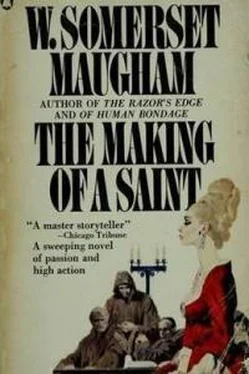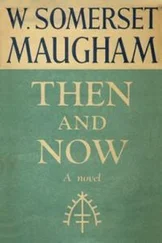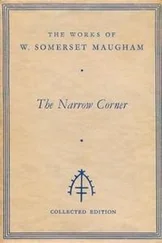Уильям Моэм - The Making of a Saint
Здесь есть возможность читать онлайн «Уильям Моэм - The Making of a Saint» весь текст электронной книги совершенно бесплатно (целиком полную версию без сокращений). В некоторых случаях можно слушать аудио, скачать через торрент в формате fb2 и присутствует краткое содержание. Год выпуска: 2014, Издательство: epubBooks Classics, Жанр: Классическая проза, на английском языке. Описание произведения, (предисловие) а так же отзывы посетителей доступны на портале библиотеки ЛибКат.
- Название:The Making of a Saint
- Автор:
- Издательство:epubBooks Classics
- Жанр:
- Год:2014
- ISBN:нет данных
- Рейтинг книги:5 / 5. Голосов: 1
-
Избранное:Добавить в избранное
- Отзывы:
-
Ваша оценка:
- 100
- 1
- 2
- 3
- 4
- 5
The Making of a Saint: краткое содержание, описание и аннотация
Предлагаем к чтению аннотацию, описание, краткое содержание или предисловие (зависит от того, что написал сам автор книги «The Making of a Saint»). Если вы не нашли необходимую информацию о книге — напишите в комментариях, мы постараемся отыскать её.
The Making of a Saint — читать онлайн бесплатно полную книгу (весь текст) целиком
Ниже представлен текст книги, разбитый по страницам. Система сохранения места последней прочитанной страницы, позволяет с удобством читать онлайн бесплатно книгу «The Making of a Saint», без необходимости каждый раз заново искать на чём Вы остановились. Поставьте закладку, и сможете в любой момент перейти на страницу, на которой закончили чтение.
Интервал:
Закладка:
Then I went to the old palace which I had not seen for so many years. I had been too excited to get really home to notice anything of the streets as I passed through them; but as I came in view of the well–remembered walls, I stopped, overcome with strange emotions…. I remembered the day when news had been brought me that the old Vitelli, who was then ruler of Castello, had murmured certain things about me which caused my neck to itch uncomfortably—and upon this I had entrusted my little brother to a relative, who was one of the canons of the cathedral, and the palace to my steward, and mounting my horse, ridden off with all possible haste. I had supposed that a few months would calm the angry Vitelli, but the months had lengthened out into years, and his death had come before his forgiveness. But now I really was back, and I did not mean to go away; my travels had taught me caution, and my intrigues at Forli given me enough excitement for some time. Besides, I was going to marry and rear a family; for, as if Fortune could not give scantily, I had gained a love as well as a home, and everything I wished was granted.
My meditations were interrupted.
' Corpo di Bacco! '
It was Matteo, and in a moment I was in his arms.
'I was just asking myself what that fool was staring at this house for, and thinking of telling him it was impolite to stare, when I recognised the house's owner.'
I laughed, and shook his hand again.
'Well Filippo, I am sure we shall be very pleased to offer you hospitality.'
'You are most kind.'
'We have annexed the whole place, but I daresay you will be able to find room somewhere. But come in.'
'Thanks,' I said, 'if you do not mind.'
I found Checco, Bartolomeo and his two sons sitting together. They jumped up when they saw me.
'What news? What news?' they asked.
Then suddenly I remembered the terrible story I had to tell, for in my own happiness I had forgotten everything that went before. I suddenly became grave.
'Bad news,' I said. 'Bad news.'
'Oh, God! I have been foreboding it. Every night I have dreamed awful things.'
'Checco,' I answered. 'I have done all I could; but, alas! it has been of no avail. You left me as a protector and I have been able to protect no one.'
'Go on!'
Then I began my story. I told them how the Council had opened the gates, surrendering unconditionally, and how the Countess had sallied forth in triumph. That was nothing. If there had been no worse news for them than that! But Checco clenched his hands as I related the sacking of his palace. And I told him how old Orso had refused to fly and had been seized, while I had lain senseless on the floor.
'You did your best, Filippo,' said Checco. 'You could do nothing more. But afterwards?'
I told them how Marco Scorsacana and Pietro had been taken prisoners, and led into the town like thieves caught in the act; how the crowd had gathered together, and how they had been brought to the square and hanged from the Palace window, and their bodies torn to pieces by the people.
'Oh, God!' uttered Checco. 'And all this is my fault.'
I told them that the old Orso was brought forward and taken to his palace, and before his eyes it was torn down, stone after stone, till only a heap of ruins marked the site.
Checco gave a sob.
'My palace, my home!'
And then, as if the blow was too great, he bent his head and burst into tears.
'Do not weep yet, Checco,' I said. 'You will have cause for tears presently.'
He looked up.
'What more?'
'Your father.'
'Filippo!'
He started up, and stepping back, stood against the wall, his arms against it, outstretched, with white and haggard face and staring eyes, like a hunted beast at bay.
I told him how they had taken his father and bound him, and thrown him down, and tied him to the savage beast, and how he had been dragged along till his blood spattered on the pavement and his soul left him.
Checco uttered a most awful groan, and, looking up to heaven, as if to call it in witness, cried,—
'Oh, God!'
Then, sinking into a chair, he buried his face in his hands, and in his agony swayed from side to side. Matteo went up to him and put his hand on his shoulder, trying to comfort him; but he motioned him aside.
'Let me be.'
He rose from his seat, and we saw that his eyes were tearless, for his grief was too great for weeping. Then, with his hands before him like a blind man, he staggered to the door and left us.
Scipione, the weak man, was crying.
XXXVIII
One does not really feel much grief at other people's sorrows; one tries, and puts on a melancholy face—thinking oneself brutal for not caring more, but one cannot; and it is better, for if one grieved too deeply at other people's tears life would be unendurable; and every man has sufficient sorrows of his own without taking to heart his neighbour's. The explanation of all this is that three days after my return to Città di Castello I was married to Giulia.
Now I remember nothing more. I have a confused idea of great happiness; I lived in an intoxication, half fearing it was all a dream, enchanted when anything occurred to assure me it was true. But the details of our life I have forgotten; I remember I was happy. Is it not a curious irony that we should recall our miseries with such plainness, and that our happiness should pass over us so indistinctly, that when it has gone we can scarcely realise that it ever existed? It is as though Fortune were jealous of the little happiness she has given us, and to revenge herself blots it out of the memory, filling the mind with miseries past.
But some things I recollect about others. I came across Ercole Piacentini and his wife Claudia. Castello being his native place, he had gone there on the death of the Count; and now, although the Riarii were restored to power, he remained, presumably to watch our movements and report them at Forli. I inquired whom he was, and after some difficulty discovered that he was the bastard of a Castello nobleman and the daughter of a tradesman. I saw that he did not lie when he said he had in his veins as good blood as I. Still I did not think him a very desirable acquisition to the town, and as I was in some favour with the new Lord I determined to procure his expulsion. Matteo proposed picking a quarrel with him and killing him, but that was difficult, because the bold man had become singularly retiring, and it was almost impossible to meet him. The change was so noticeable that we could not help thinking he had received special instructions from Forli; and we determined to take care.
I invited the Moratini to live with me; but they preferred to take a house of their own. The old man, when I asked him for his daughter's hand, told me he wished no better son–in–law, and was very contented to see his daughter again settled under a man's protection. Scipione and Alessandro were both most pleased, and they redoubled the affection they had felt for me before. It all made me extremely happy; for after my long years of wandering I yearned very much for the love of others, and the various affections that surrounded me soothed and comforted me. From Giulia I could ask for nothing more, and I thought she really loved me—of course, not as I loved her, for that would have been impossible; but I was happy. Sometimes I wondered perplexedly at the incident which had separated us, for I could understand nothing of it; but I put it away from me, I did not want to understand, I wanted only to forget.
Then there were Checco and Matteo. The Orsi family had bought a palace in Castello, and there they could have settled themselves happily enough had they not been driven on by an unextinguishable desire to regain what they had lost. Checco was rich even now, able to live as luxuriously as before, and in a little while he might have gained in Castello as much power as he had lost in Forli, for the young Vitelli had been singularly attracted by him, and was already inclined to give trust to his counsels; but the wretched man was filled with sadness. All day his thoughts were in the town he loved so well, and now his love was increased tenfold…. Sometimes he would think of Forli before the troubles, when he was living a peaceful life surrounded by his friends; and in mind, he wandered through the quiet streets, every house of which he knew. He would go from room to room in his palace, looking at the pictures, the statues, the armour; from the window at night he gazed upon the dark, silent town, with the houses rising like tall phantoms; in the morning a silver mist covered the earth, and as it rose left the air cool and fresh. But when his house appeared before him, a bare heap of ruins, with the rain beating down on the roofless stones, he would bury his face in his hands, and so remain during long hours of misery. Sometimes he would review the stirring events, which began with the attempted assassination of himself and ended with the ride out of the gate by the river in the cold open country beyond; and as they passed before him, he would wonder what he had done wrong, what he might have done differently. But he could alter nothing; he saw no mistake other than of trusting the populace who vowed to follow him to death, and of trusting the friends who promised to send him help. He had done his part, and what had followed was impossible to foresee. Fortune was against him and that was all….
Читать дальшеИнтервал:
Закладка:
Похожие книги на «The Making of a Saint»
Представляем Вашему вниманию похожие книги на «The Making of a Saint» списком для выбора. Мы отобрали схожую по названию и смыслу литературу в надежде предоставить читателям больше вариантов отыскать новые, интересные, ещё непрочитанные произведения.
Обсуждение, отзывы о книге «The Making of a Saint» и просто собственные мнения читателей. Оставьте ваши комментарии, напишите, что Вы думаете о произведении, его смысле или главных героях. Укажите что конкретно понравилось, а что нет, и почему Вы так считаете.











